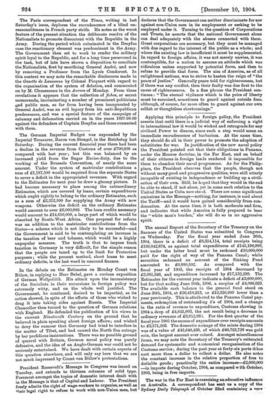significant, if informal, contribution to the solution of the problem
of Imperial defence. Under the heading of "The Great Sea Raid" the writer gives, in the form of a circumstantial narrative, illustrated by maps, an imaginative forecast of the bombardment of Sydney by a combined Russian and German fleet in the year 1906. The lessons which the writer seeks to drive home are the unpreparedness of the Commonwealth, and the dangers of trusting to improvisation in the hour of peril. "Australia was in miniature "—we quote from the concluding passages of the narrative—" an example of how tremendous was the task of protecting the Empire when it was unex- pectedly beset by a powerful naval combination Bravery, valour, and heroism were proved to be small factors as compared with perfect armaments, and trained and skilled men to manage them If the advice of Major-General Hutton two years before that the force at the island was 'altogether insufficient to ensure its security' had been heeded, this disaster could have been avoided Australia was paying an enormous price for its parsimony, but the morning after the initial attack you could have raised nearly enough by voluntary subscriptions to have purchased a warship.
This was the beginning of the 'more ships' policy in the meantime the Australian had simply to look on with gritted teeth and see his cities smashed and the commerce of his country ruined." As Tariff Reformers are fond of identify- ing Free-trade with "Little Englandistai," it is worth adding that the Sydney Daily Telegraph, in which this Australian "Battle oft' Dorking" appears, is a supporter of Free- trade.































































 Previous page
Previous page